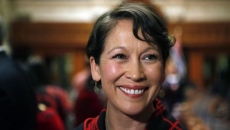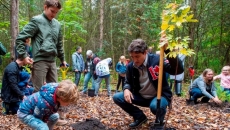WASHINGTON - Long before climate change seized the global conscience, when the environment struggled for political traction, North America's Great Lakes were a dumping ground — a toxic monument to industrial excess on either side of the Canada-U.S. border.
More than three decades later, North America's single largest source of freshwater is back in the public spotlight, this time for seemingly all the right reasons — thanks, at least in part, to the political woes of a certain U.S. president.
Joe Biden, facing a Republican reckoning in November's midterm elections, marked one year since his inauguration with a vow to get out of the White House and brag a little more about his legislative wins.
"I'm going to get out of this place more often," Biden said. "I'm going to make the case of what we've already done, why it's important, and what will happen if they support what else I want to do."
So it was, then, that Biden found himself in Lorain, Ohio, last month, announcing plans to spend no less than US$1 billion on what he called the most significant restoration of the resource "in the history of the Great Lakes."
The money is a small portion of the $1.2-trillion Bipartisan Infrastructure Law, which the White House has been promoting throughout 2022 after the pre-Christmas collapse of what was supposed to be the administration's crowning achievement: the $2-trillion climate and social spending package known as the Build Back Better bill.
"Three decades ago we made this commitment," Biden said. "There was a lot of talk, a lot of plans, but very little progress. It was slow. That changes today."
The effort will target 22 of the 25 problem areas, known as "areas of concern," on the U.S. side of the lakes — a level of commitment that experts, advocates and activists have been clamouring for since the 1990s and beyond.
"That's a huge thing, you know?" said John Hartig, a U.S.-born conservation scientist who's currently serving as a visiting scholar at the University of Windsor's Great Lakes Institute for Environmental Research.
Hartig, widely hailed as one of the world's leading experts on Great Lakes remediation, grew up in Detroit before becoming the first graduate to earn a PhD at the institute more than 35 years ago.
"Money makes this go, right? You need resources to do it, you can't just talk about it. So these are pretty significant investments."
The same is true on the Canadian side — and hopes are high that the latest levels of ambition in the U.S. will increase pressure on the federal and Ontario governments to finally finish what they started.
It's happening already: Environment Minister Steven Guilbeault visited Hamilton Harbour on Wednesday to announce major progress on Randle Reef, long the single most polluted area of concern on the Canadian side of the lakes.
The remaining toxins on the reef are now fully contained inside an engineered containment facility, Guilbeault said — Stage 2 of a three-stage, $139-million project paid for through a public-private partnership, with Ottawa, Ontario and local partners each providing a third of the funding.
The final step, a two-year process to begin this fall, will involve capping the facility to complete the isolation process while also providing new port lands in the harbour.
The federal government is bound to protecting the lakes through the Canada-U.S. Great Lakes Water Quality Agreement, which dates back to 1972 but was renewed in 2012, as well as a new agreement with the Ontario government that took effect just last June.
That agreement sets a 2026 deadline for Ottawa and the province to shore up six other specific areas of concern in Ontario.
Hartig cited a 2018 study that Biden also happened to mention: a University of Michigan examination of the impact of cleanup investments made between 2010 and 2016 by the Great Lakes Restoration Initiative, a multi-agency task force established in 2004 by then-president George W. Bush.
The findings? Money well spent.
"For every dollar spent on those projects, you will get $3.35 in economic activity up through 2035, including economic redevelopment," Hartig said. "That's a pretty good return on investment — for anywhere, really."
Canada has not been lagging the U.S., Hartig added, citing the $139-million project on Randle Reef and about $80 million spent since 1987 on habitat rehabilitation along the shores of Lake Ontario near Toronto.
The next step, he said, is the so-called "Action Plan to Protect the Great Lakes," a 10-year, billion-dollar effort to protect the lakes from climate change, exposure to toxins, algal blooms and contaminated beaches.
Hartig said he's hopeful that Biden's investment, coupled with Canada's progress to date, will make that a top priority soon.
"I think this is going to be an incentive to take a harder look at the action plan," Hartig said.
"Investing in protection of the Great Lakes is investing in the communities of the Great Lakes, and it is such a precious resource, so yeah, I do think that they will take a good hard look at that as a result of it."
Cleaning up polluted sites, however, is far from the only challenge — especially with the impacts of climate change looming ever larger.
A coalition of U.S. and Canadian mayors from within the Great Lakes and St. Lawrence River basin is urging the federal government to turn its attention to the threat of coastal erosion and flooding from rising water levels.
That effort, the Great Lakes and St. Lawrence Cities Initiative, is calling on Ottawa to implement an expanded version of the action plan, this one with a $2.2-billion price tag over 10 years.
Municipal leaders in Ontario and Quebec want the federal government to spend $1 billion to establish a joint office of "shoreline climate adaptation and resilience" to backstop long-term planning efforts along the St. Lawrence and Great Lakes corridor.
“We need action from all levels of government to better support planning and spur investments in long-term, environmentally friendly solutions to protect our shorelines and waterfronts," Canadian co-chair and Collingwood Mayor Brian Saunderson said in a statement.
"The federal government needs to make this issue a top priority and work with the Ontario and Quebec governments to safeguard property and water quality."






